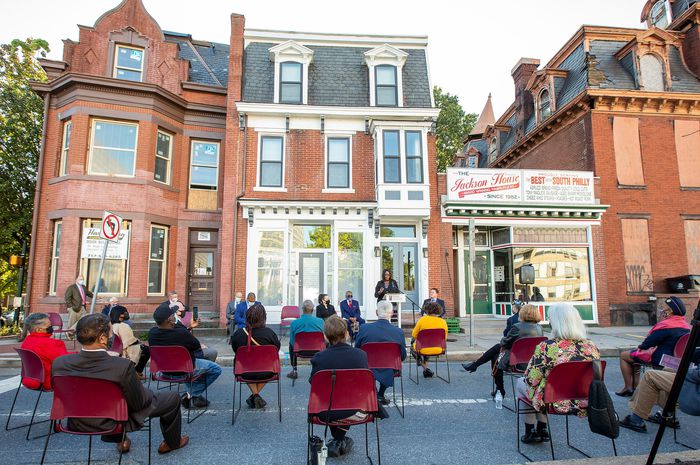By Jan Murphy | [email protected]
Calobe Jackson Jr. grew up in his dad’s barbershop on North Sixth Street in Harrisburg listening to the stories told by the doctors, lawyers and other influential Black people who stopped in for a shave and a haircut.
“You heard them and saw them in their relaxed mode and you could understand the stories that they told,” Jackson said.
From the time spent in the barbershop as a young boy and continuing through 40-year career at the city’s post office and community service, Jackson accrued a strong knowledge of Harrisburg history and its Black heritage and has willingly shared it in various ways over the years.
The 90-year-old Jackson was honored on Sunday for his decades of community service by the Historic Harrisburg Association at an outdoor ceremony due to COVID-19 concerns.
The event, which took place in front of Jackson’s boyhood home where his dad had his barbershop, also included officially designating that area of the city as Jackson Square. An outdoor history exhibit titled, “The African-American Business District that became ‘Jackson Square’” was unveiled that stands on a peat moss covered island at the south end of the 1000 block of North Sixth Street.
Buildings in that block are in the process of being restored into affordable housing and commercial spaces. Behind this restoration project is a team of investors that includes Harrisburg native sons and professional football players LeSean and LeRon McCoy, and Ryan Sanders, of Vice Capital and R.B. Development, who have set out to preserve this last remnant of the city’s African-American business district.
Sanders, who was in attendance at the ceremony, said the blocklong project envisions making it a business corridor again.
“We’ll take it from one business [the Jackson House restaurant] to seven or eight,” Sanders said.
But in the early part of the last century, North Sixth Street had all sorts of businesses operating there. Jackson shared that next to his father’s barber shop was home to the “Jackson House,” a rooming house once owned by another Jackson family. Both his father’s barbershop and the rooming house were listed in the “Green Book,” a traveler’s guide indicating where Black people were welcome during the time of segregation.
In telling the approximate 50 invited guests about the block’s history, Jackson recalled as a boy, seeing boxing legend Joe Louis entering the Jackson House. He then launched into a litany of the names of African-American and other businesses that once lined Sixth Street up to Division Street.
“They’re all gone. Not only are the businesses gone, the buildings are physically gone,” Jackson said.
“This is why this is so important,” he said, referring to the rehabilitation project underway in his old neighborhood. “This the area we can come to called Jackson Square. These are the original buildings and it’s important we remember them.”
Tom Darr, president of the Historic Harrisburg Association’s board, credited both Jackson and the team of people involved in the rehabilitation project for their contributions to preserving the city’s heritage.
He described Jackson as a “a man who has brought to Harrisburg so much knowledge of urban history” through his research and remembrances.
As for the McCoy brothers and those involved in breathing new life into the block, Darr acknowledged their role as one that is “not only fostering economic development but also preserving history for new generations to know and see with their own eyes.”
Representatives from Historic Harrisburg Association as well as the city, county and state governments heaped praise and proclamations on Jackson for his service to the community that went well beyond being a self-described Harrisburg historian.
Over the years, he spent time on the city’s school board as well as heading up its board of control when the district fell under mayoral control. During that time on the board of control, Jackson, who studied math at Lincoln University, helped establish the city school’s Math-Science Academy and Sci Tech High to enhance the education of Harrisburg’s youth.
In addition to his U.S. Postal Service career, he also has served in various other roles including as a member of the Harrisburg Planning Commission, as a trustee of Harrisburg University and the Historical Society of Dauphin County, among others.
Receiving the “Toast of Historic Harrisburg” recognition and acknowledgements of the contributions he has made over the course of his lifetime during the ceremony put a big smile on his face that could be seen once he removed his mask.
“This is quite an honor. It’s an honor for me. It’s an honor for my family. It’s an honor for Harrisburg,” Jackson said. “Thank you. Thank you so much.”
On Saturday, Jackson will help with a Historic Harrisburg Association walking tour of the Old 8th Ward, Jackson Square and Harrisburg’s African-American Heritage. Participants should meet at 10 a.m. at the Capitol East Wing fountain along Commonwealth Avenue. For more information, visit www.
Jan Murphy may be reached at [email protected]. Follow her on Twitter at @JanMurphy.

